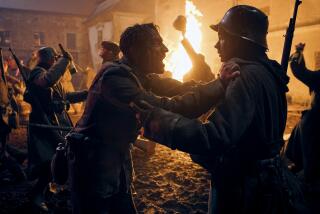‘Citizen Kane’ vs. ‘Vertigo’: What does Sight & Sound poll really mean?
- Share via
Hard-core cineastes have been a’twitter for the past 24 hours, on cinephile message boards but also on Twitter (hey, they use it too) about Sight & Sound’s newly released once-a-decade critics poll.
The British Film Institute magazine, in case you haven’t heard, named Alfred Hitchcock’s “Vertigo” its best film of all time, per the decennial survey it recently conducted with 846 critics. Orson Welles’ “Citizen Kane”? It ended up in second place, a seemingly shocking turn considering it had won every one of these polls since 1962.
The reaction to this news has been split — abject horror that Welles could be knocked off his perch by a genre hack (a) or it’s about time any director, and certainly one as great as Hitchcock, ripped up that paper tiger and the sled he rode in on (b).
PHOTOS: Billion-dollar movie club
No matter which side you come down on, there’s something refreshing about the idea of a change. Having a single movie dominate our consciousness for so long isn’t great for cinema and, perhaps, isn’t even great for the movie. I’m always surprised when a young film fan watches “Citizen Kane” and comes away with an “I-liked-it-but-I-wasn’t-blown-away,” an unfortunate (and unnecessary) note of disappointment creeping in simply because he’s been hammered home the idea (aided by more than 50 years of polls like this) that “Citizen Kane” is The Best Movie Of All Time.
But let’s leave aside that issue, along with the debate itself — which movie is “better” is a subjective judgement for the most similar movies, let alone ones as different as these. The real question is, is there a major shift going on here?
The subtext in this debate is yes, that a nuanced character study like “Kane” has now given way to a genre exercise, no matter how enjoyable, of sanitarium nightmares and mistaken identities. After decades of modern filmmakers emulating Hitchcock, after years when a certain kind of elevated genre film has come to dominate not only the box office but critics’ consciousness (see under the “Dark Knight” movies), this is the result.
But the truth (as, incidentally, the main characters from both “Kane” and”Vertigo”could tell you) is more complicated. To use this list as a gauge of any sort is a shaky proposition. Sight & Sound has widened the poll considerably since its 2002 ballot (“Kane” won that because it received 46 top votes to “Vertigo’s” 41, compared to “Vertigo’s” victory of 191-157 this time around). And Hitchcock has always been a more populist choice than Welles.
The switch may not be the seismic shift it would appear to be — just a function of what happens when you ask more people. Had Sight & Sound done that in 2002 — or, for that matter, in 1982 — it might have netted the same result.
And let’s not forget that some of this is simply a matter of distance. It took “Citizen Kane,” now regarded as an unimpeachable classic, decades to lodge itself in our consciousness. In 1952, 11 years after it came out, “Kane” didn’t even make the top 10 of Sight & Sound’s first-ever poll (“The Bicycle Thief” led the list). “Vertigo” itself got mixed reviews upon its release in 1958 and didn’t even land on the Sight & Sound list until 24 years later, when it debuted at No. 7. It’s climbed steadily ever since. Time, apparently, heals all wounds, and makes good movies even better.
RELATED:
Citizen Kane gets inside the castle
Hitchcock stages a show at the Orpheum
Follow me on twitter at https://twitter.com/ZeitchikLAT
More to Read
Only good movies
Get the Indie Focus newsletter, Mark Olsen's weekly guide to the world of cinema.
You may occasionally receive promotional content from the Los Angeles Times.









